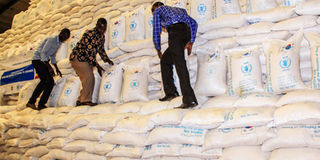Why Karamoja depends on food aid

Storage. World Food Programme officials pile bags of food in a warehouse in Tororo District on July 14, 2018. WFP seeks $15.3m to feed needy refugees in Uganda. PHOTO BY RACHEL MABALA
What you need to know:
- Karamoja is besieged by donor agencies dominated by WFP that have injected billions of shillings into the sub-region, although this has not prevented the area from continuous dependence on donor aid.
Karamoja. The World Food Programme (WFP) last month supplied Super Cereal, a fortified blended food that is suspected to have been poisoned.
Four people reportedly died in Amudat and Napak districts, Karamoja Sub-region.
This occurrence provoked the intervention of Ministry of Health officials which issued a statement saying 262 people, who ate the porridge, developed mental confusion, high fever and abdominal pain within a week.
Joint investigations into the possible contamination of the food that was distributed by WFP to prevent malnutrition in Karamoja Sub-region have since been instituted.
The investigations are being conducted by WFP, police and the Ministry of Health.
The WFP has since said it will engage Demirpolat Group, a Turkish company which supplied the food.
Mr Ryan Anderson, the WFP deputy country director, says the company will be contacted by WFP officials in Rome, Italy, where the global food aid agency is based.
Action plan
The government in 2009 introduced the Karamoja Action Plan for Food Security, a five year project that was aimed at ensuring food security in the area.
Leaders and locals explain that the sub-region continues to experience little rainfall that is inadequate for farming.
Mr Simon Lokol, a resident of Lotome Village in Napak District, observes that they have experienced harsh weather conditions this year that have resulted in total crop failure. He said they experienced very heavy rainfall and later prolonged drought.
“While we thought the planting season was on, we rushed to open our gardens and planted crops which were affected by the heavy rains that caused flooding,” he says.
Ms Betty Nangiro, a mother of three and a resident of Iriiri Sub-county in Napak District, appeals to the government to set up irrigation schemes to enable them irrigate their crops throughout the year.
“It is only through irrigation that we can become self-reliant. Short of that, we shall continue relying on food aid,” she says.
Dodoth East MP Samson Lokeris says although the Karimojong have embraced farming, they have consistently been hit by drought.
“The unpredictable weather conditions have forced our people to continue depending on food aid,” he says.
Mr Lokeris says most of the households survive on a single meal a day.
Mr Lokeris, who doubles as chairperson of Karamoja parliamentary group, calls for government’s urgent intervention to feed its people.
“If WFP gives out food, it should be supplementary from what government gives, otherwise the situation is very bad,” he says.
Mr Mark Abuku, the Kaboong District chairperson, says more than 30,000 people in the district are starving.
“The situation is very bad if government delays to respond, people are going to die of hunger,” he says.
Mr Joseph Lomonyang, the Napak District chairperson, says government should not wait to register deaths in order to act.
Daily Monitor visited some families in Kaabong and discovered that most households survive on fruits.
Ms Grace Nacuka, a mother of four in Sidok Village in Sidok Sub-county, Kaabong District, says government should come to their rescue as they only survive on wild bitter fruits.
“We do not know how the situation will be in the next one month if government does not respond and rescue us,” she says.
The current situation in Karamoja has forced women in Napak and Amudat districts to turn down several calls from the district authorities and WFP to return the food suspected to have been poisoned.
A total of 2,572 women in Napak and Amudat districts received porridge flour from WFP that turned to be poisonous but they have refused to return it on condition that the government must replace it first before they act.
About Karamoja
Karamoja is besieged by donor agencies dominated by WFP that have injected billions of shillings into the sub-region, although this has not prevented the area from continuous dependence on donor aid.
The sub-region is in north eastern Uganda, an area that has always been hit by food and nutritional insecurities.
It comprises several tribes, with majority being Karimojong.
Others include Jie, Turkana, Dodoso, Nyakwai, Toposa and Nyangatom.
Previously, their main source of livelihood was herding cattle due to their pastoral background, although they are slowly adapting to crop farming.
Being semi-nomadic agro-pastoralists, Karimojong own large herds of livestock.
The area experiences severe hunger despite the presence of fertile soils suitable for crop growing.



